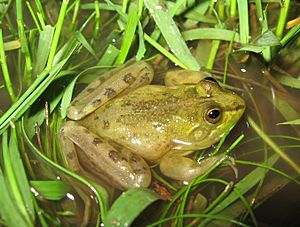Pseudis minuta facts for kids
Quick facts for kids Pseudis minuta |
|
|---|---|
 |
|
| Conservation status | |
| Scientific classification |
|
| Kingdom: | Animalia |
| Phylum: | Chordata |
| Class: | Amphibia |
| Order: | Anura |
| Family: | Hylidae |
| Genus: | Pseudis |
| Species: |
P. minuta
|
| Binomial name | |
| Pseudis minuta Günther, 1858
|
|
| Script error: The function "autoWithCaption" does not exist. | |
| Synonyms | |
|
|
Script error: No such module "Check for conflicting parameters".
Pseudis minuta (also known as the lesser swimming frog) is a small, water-loving frog. It belongs to the Hylidae family, which includes many tree frogs. You can find this frog in parts of South America, specifically in northeastern Argentina, Uruguay, and southern Brazil. It might also live in southern Paraguay.
Contents
Physical Description and Appearance
These frogs are quite small. Male Pseudis minuta frogs are about 2.4 to 3.9 centimeters (1 to 1.5 inches) long from their snout to their rear. Females are a bit larger, measuring about 3.9 to 5.1 centimeters (1.5 to 2 inches).
Their snout, which is the front part of their head, looks flat when you see it from the side. They have thin fingers and long, slender back legs. This helps them move well in the water.
The color of these frogs can be light green or brownish. They often have small, dark spots on their backs. Sometimes, you might even see a clear, light stripe running down the middle of their back. A light stripe also usually runs along most of their sides. Their thighs often have three clear stripes.
Frog Calls and Behavior
Male Pseudis minuta frogs usually call at night. They float on the water's surface and hold onto plants. Sometimes, they even call from the leaves of plants like water hyacinths, with their whole body out of the water.
Their calls include a special "advertisement call" to attract females. They also have two different "aggressive calls." These aggressive calls are used when male frogs interact with each other. Sometimes, these interactions can even involve wrestling!
Habitat and Conservation Status
The lesser swimming frog is a very common frog that lives in water. You can find it in ponds and calm pools of slow-moving creeks. It lives in areas that are less than 500 meters (about 1,640 feet) above sea level.
These frogs can also live in rice fields, which are often flooded with water. There are no big known threats to this frog species. In fact, it seems to do well even in places like rice plantations that might use a lot of pesticides. The Pseudis minuta frog is found in several protected natural areas.
See also
 In Spanish: Pseudis minuta para niños
In Spanish: Pseudis minuta para niños
 | Emma Amos |
 | Edward Mitchell Bannister |
 | Larry D. Alexander |
 | Ernie Barnes |


